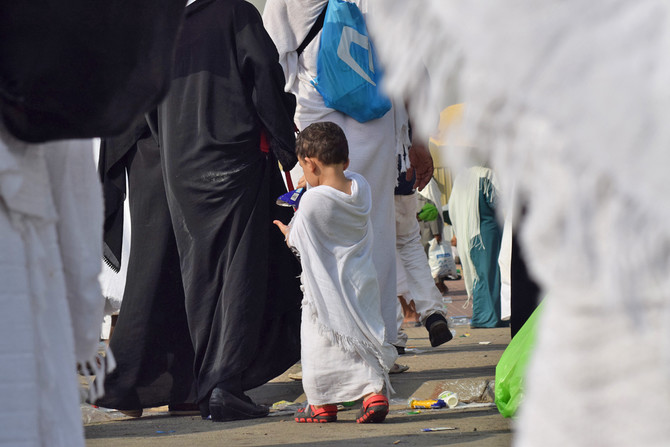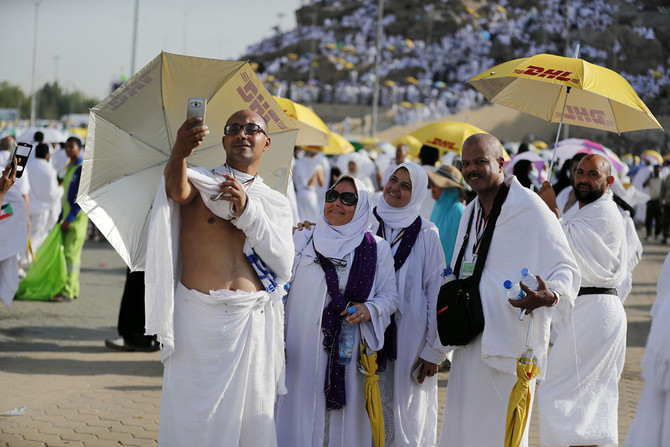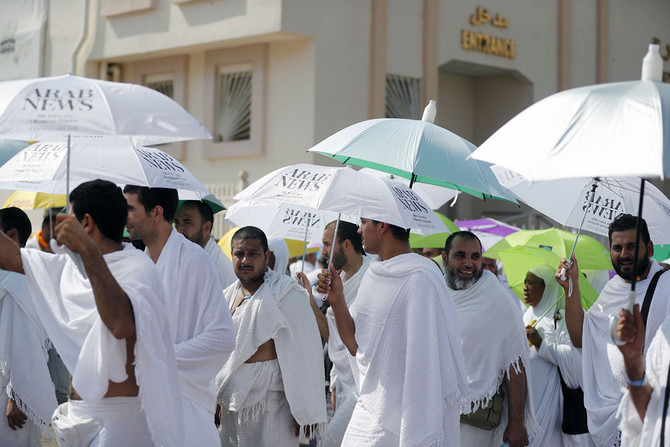JEDDAH: Millions of pilgrims gathered on Monday on the plains of Mount Arafat to perform the pinnacle of the Hajj pilgrimage.
On Arafat pilgrims spent the day praying and repenting and praying for personal strength in the future.
It is the most important part of the Hajj pilgrimage, during which the Khutbah (sermon) of Hajj is narrated and Dhuhr and Asr prayers are offered together.
Buses could be seen parked around the hill as workers hurriedly picked up empty water bottles near a yellow sign that read “Arafat starts here” in both English and Arabic.
Carrying brightly colored umbrellas under the blazing sun, worshippers scaled the rocky hill southeast of the holy city of Makkah.
#Pilgrims pray and repent on the 2nd day of #Hajj2018 at #MountArafat #Makkah #ArafatDay #SaudiArabia #Mecca https://t.co/jNrEvzyFqi pic.twitter.com/VD2nqiyZkG
— Arab News (@arabnews) August 20, 2018
Arms raised, pilgrims repeated “There is no God but Allah” and “Allahu Akbar” (God is greatest).
“The feeling is indescribable,” said Umm Ahmad, 61, who made the journey from Egypt, told AFP.
This year almost 2.4 million Muslims, from every corner of the world, left Mina headed to Arafat. The pilgrims made the journey with ease the movement of traffic was smooth.
Traffic authorities, security personnel and staff from various government and private sector organizations, in addition to 4,000 Saudi scouts, have been deployed to assist and guide the pilgrims in several languages.
The Saudi leadership ordered authorities to provide more comfort, security and tranquility for pilgrims to complete their rituals.
Some of the pilgrims — men in white seamless garments and women in loose dresses — pushed elderly relatives in wheelchairs on the second day of the Hajj.
Jai Saleem, a 37-year-old Pakistani, said he cried when he and his wife arrived on Mount Arafat, where Muslims believe Prophet Muhammad delivered his final sermon.
Almost 2.4 million #Muslims from every corner of the world ascend #MountArafat for the first day of #Hajj2018 pilgrimage #Makkah #ArafatDay #SaudiArabia #Mecca https://t.co/jNrEvzyFqi pic.twitter.com/FgYBZGl5Wx
— Arab News (@arabnews) August 20, 2018
“It feels great,” he said. “I have always seen this area, since my childhood, in photographs and on television.”
Pilgrims had spent the night in an encampment around the hill where they believe the Prophet Muhammad gave his last sermon.
Others praying in the nearby Mina area ascended in buses or on foot from before dawn, as security forces directed traffic and helicopters and surveillance drones hovered overhead.
Some pilgrims carried umbrellas to protect themselves from the sun as temperatures passed 40C after an evening of thunderstorms and high winds.
Men and women from 165 countries gathered side by side, while soldiers handed out bottled water and some people snapped selfies.
Pakistani pilgrim Mohamed Forqan, 30, said it was a great day to be a Muslim. “Here in Arafat we feel that we are born today, asking Allah to forgive our sins,” he said.
Hilal Issa, 70, from Algeria, said he was praying for God to pardon all Muslims and save the Arab world from its afflictions.
“We know that it’s a difficult task,” said Amna Khan, a 35-year-old American Muslim pilgrim. “That’s why we are all here. We’re doing this to get closer to Allah, to be absolved.”
A hot wind blew across the rocky outcrop and the surrounding plain, and many pilgrims sipped from bottles of water throughout the day.
“I knew it would be a little hard to climb Mount Arafat,” said Nigerian pilgrim Saidou Boureima. “So I prepared for this challenge by working out. And God willing, we can see it through.”
The Hajj is one of the five pillars of Islam, which every Muslim is required to complete at least once in their lifetime if they are healthy enough and have the means to do so.
Arafat includes an open plain and Mount Arafat, which is also called Jabal Al-Rahma (Mountain of Mercy), that is 300 meters wide and 70 meters high.
Arafat is surrounded by an arc of mountains and Wadi Arana and is located east of Makkah.
On Tuesday, Muslims will observe the first day of Eid Al-Adha, or Feast of Sacrifice, which marks the end of the Hajj. They traditionally slaughter sheep for the three-day festival, a tribute to the Prophet Ibrahim’s sacrifice of a lamb after God spared Ishmael, his son.
They will consume some of the meat and give the rest to poor people unable to buy food.
A new Kiswa, the cloth embroidered with verses from the Holy Qu’ran, was placed over the Kaaba in the Grand Mosque in Makkah early on Monday, in a traditional ceremony that takes place on the same day each year.
Pilgrims will return there to pray at the end of the Hajj.












































